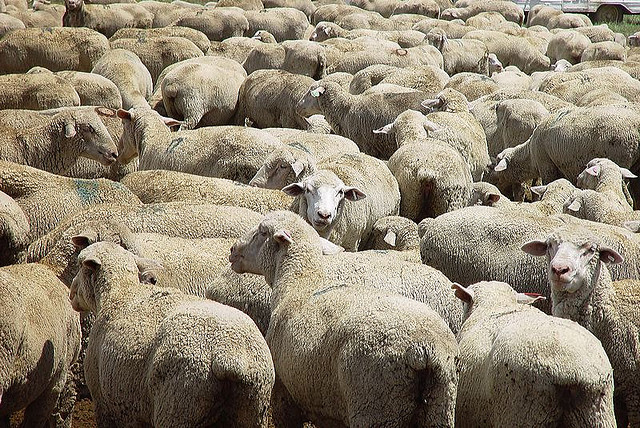Image by James Good
Garrett Hardin's idea of "The Tragedy of the Commons" has become well known, but not always really understood. In my case, I can say that I have big troubles in having my students grasping its mechanism; that is the interplay of individual advantage versus public goods; the basic factor that leads to what we call "
Perhaps the problem lies in the fact that Hardin used the example of sheep and pastures to explain the reasons of the tragedy, but that's rather unfamiliar to my students (as well as to most of us). For instance, many of my students don't seem to be able to grasp the concept of "overgrazing", that is the fact that grass doesn't regrow if it is grazed too much. Besides, the pastures that Hardin was considering never experienced the "tragedy"; they were well managed and well regulated, specifically in order to avoid it.
So, let me propose a different example for the mechanism of overexploitation, based on a real event that happened to me. Maybe it can explain the concept better.
Just a few days ago I was literally kidnapped inside an underground parking in Florence because I had lost my entrance ticket, with the employees of the
I described the experience in detail in a post in Italian, that you may machine translate if you are really interested. The gist of the story, anyway, is that I found myself caught in a trap mainly designed to siphon out some money out of the pockets of the hapless foreign tourist passing by. In my case, I was able to negotiate my release and avoid paying the exorbitant surcharge. But, put yourself in the shoes of someone who doesn't speak the local language, doesn't know what are his/her rights, is in a hurry; then the best strategy is to pay and be over with it. Although, after such an
Now, despite the rather nasty circumstances, what I have described is nothing more than an economic transaction. But, here, there doesn't seem to hold the conventional view that demand and offer are always the same and, at the same time, "right". What happens, instead, is the perverse mechanism of Hardin's tragedy taking hold of the situation.
Let's quantify: by forcing a tourist to pay 237 Eur, the management of the parking lot gains the difference between the normal parking rate (say, 4 euros) and the surcharge; a net gain of 233 Euros. At the same time, the fact that the tourist mugged in this way will never come back to Florence means a loss in terms of hotel rooms, meals, various purchases and more. Considering that the enraged tourist will also discourage friends and relatives from coming to Florence, the overall loss is surely of the order of several thousand euros. The transaction, therefore, turns out to be a net loss for everyone involved.
But here comes Hardin's tragedy. The loss of thousands of euros is spread over several thousands of operators in the tourism industry and for each one it is so small to be nearly invisible. Instead, the monetary gain of 233 euros is well visible for those who pocketed it. There follows that almost everyone, as an individual or a single firm, gains in overcharging tourists. That's what generates what we call a "tourist trap," a common occurrence everywhere tourists go.
It is the same mechanism of Hardin's original example, with the tourists in the role of grass and the tourism operators in the role of shepherds. In Hardin's example, overgrazing leads to the destruction of the resource (grass). In the case I was describing, tourists in Florence have not been destroyed, yet, but they are constantly overcharged, overcrowded, and overexploited
 I know what you are thinking, that Florence will always be Florence. True, but visiting Florence is, in the end, the result of the fact that it is fashionable to do it. And fashions change over time. Years ago, it was fashionable to buy
I know what you are thinking, that Florence will always be Florence. True, but visiting Florence is, in the end, the result of the fact that it is fashionable to do it. And fashions change over time. Years ago, it was fashionable to buy The final point of this discussion is to note how difficult it is for human beings to manage well the resources they exploit. The
